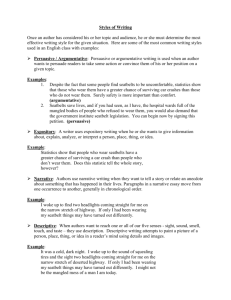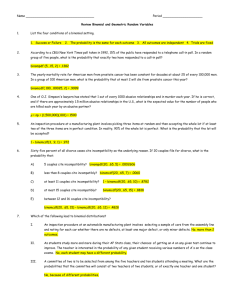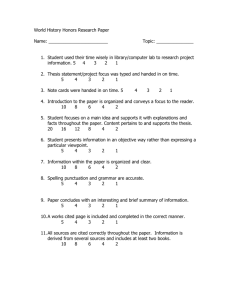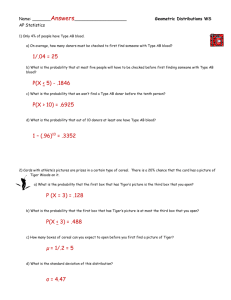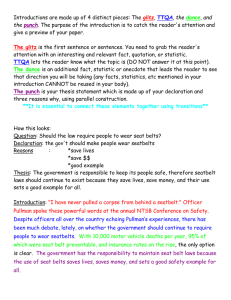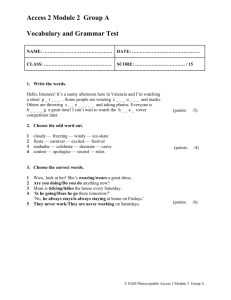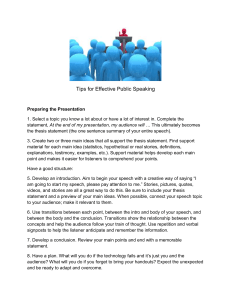Persuasive-Argumentative Speech Assignment and Workpad
advertisement
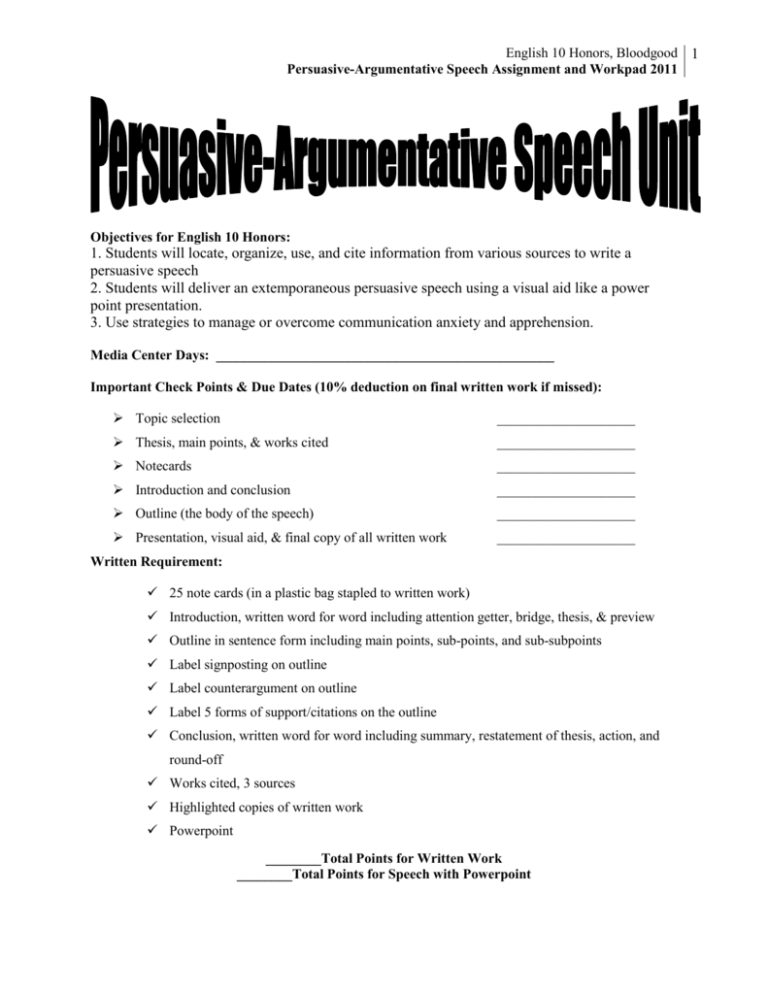
English 10 Honors, Bloodgood 1 Persuasive-Argumentative Speech Assignment and Workpad 2011 Objectives for English 10 Honors: 1. Students will locate, organize, use, and cite information from various sources to write a persuasive speech 2. Students will deliver an extemporaneous persuasive speech using a visual aid like a power point presentation. 3. Use strategies to manage or overcome communication anxiety and apprehension. Media Center Days: _________________________________________________ Important Check Points & Due Dates (10% deduction on final written work if missed): Topic selection ____________________ Thesis, main points, & works cited ____________________ Notecards ____________________ Introduction and conclusion ____________________ Outline (the body of the speech) ____________________ Presentation, visual aid, & final copy of all written work ____________________ Written Requirement: 25 note cards (in a plastic bag stapled to written work) Introduction, written word for word including attention getter, bridge, thesis, & preview Outline in sentence form including main points, sub-points, and sub-subpoints Label signposting on outline Label counterargument on outline Label 5 forms of support/citations on the outline Conclusion, written word for word including summary, restatement of thesis, action, and round-off Works cited, 3 sources Highlighted copies of written work Powerpoint ________Total Points for Written Work ________Total Points for Speech with Powerpoint English 10 Honors, Bloodgood 2 Persuasive-Argumentative Speech Assignment and Workpad 2011 Seatbelts: A Habit That Could Save Your Life 1) As you may have noticed, I have been on and off crutches for the past year and a half. It all started when I experienced a serious car accident. I was not wearing a seatbelt. In the process of being thrown back and forth across the car, I chipped a tooth, cut the back of my head, broke my hip, and cracked three ribs, which resulted in a punctured lung and massive internal bleeding. 2) Somehow I survived, and now a year and a half later I am finally walking normally. All that pain and suffering could have been avoided if only I had been in the habit of wearing my seatbelt. But I wasn’t in that habit, and I know from my class survey that 40 percent of you do not always wear one. I don’t want what happened to me to happen to you. 3) Every one of us should wear our seatbelts every time we get into a car. First, I’m going to tell you to what extent you will be protected by wearing a seatbelt. Then I’m going to look at some of the reasons why people don’t wear seatbelts and point out the problems with those reasons. And after I’ve given you the evidence, I am going to ask you to make a habit of wearing seatbelts. 4) So first, to what extent will you be protected by wearing a seatbelt? Well, the Wisconsin Department of Transportation says, “If you are in an accident and are not wearing a seatbelt, you are four times more likely to be killed than if you are wearing one.” The National Highway Traffic Safety Administration and the National Child Passenger Safety Association estimate that traffic deaths would decrease from 35,000 to around 17,000 annually if everyone wore seatbelts. So our most knowledgeable and reliable sources of information on seatbelts have all come to the same conclusion—that we would cut traffic deaths in half if everyone wore seatbelts. 5) But why is this true? What does a seatbelt do to protect your? Well, in a head-on collision your body will be thrown forward with incredible force. Imagine falling headfirst from the top of a three-story building. The force with which you would land on the ground is equal to the force with which you would be thrown forward in only a 30 mile per hour collision. But a seatbelt will absorb that force and prevent you from slamming into the interior of the car. 6) In my own experience there is little doubt that a seatbelt would have minimized my injuries. The car was totaled, but the entire driving compartment was completely intact. If I had been strapped into that seat, I would have walked away from my accident with minor bruises. But I say, “IF….” English 10 Honors, Bloodgood 3 Persuasive-Argumentative Speech Assignment and Workpad 2011 7) So the evidence is strongly in favor of wearing seatbelts. That brings me to the question—why aren’t people wearing seatbelts? 8) People often say that they would rather be thrown free of the car, or at least be able to get out of the car in case of fire or submersion in water. Well, according to the Wisconsin Department of Transportation, accidents involving fire and submersion make up less than one out of every 200 car accidents. And with regard to being thrown free of the car, The Wisconsin Department of Transportation says you are 25 times more likely to be killed if you are thrown out of the car. Clearly you are safer being strapped in than being thrown around. 9) The other major reason why people don’t wear seatbelts is that seatbelts are uncomfortable and restrict movement. Now, if this is your reason for not wearing a seatbelt, let me ask you to do something now. Imagine in your mind a two-sided scale. On one side, place the value that you place on being completely comfortable while driving. An on the other side of the scale, put the value that you place on your life and health. Which side is heavier? If your life and health mean more to you than your comfort while driving, then it only makes sense to wear your seatbelt. 10) So I’m here today to ask all of you to make a habit of wearing seatbelts. The statistics are simple—chances are that about one-third of you will be in a serious auto accident at some time in your life. It could happen fifty years from now, or it could happen tomorrow. And if you are in an accident, you are four times more likely to be killed if you are not wearing your seatbelt than if you’re wearing one. 11) So if you think you are safer not wearing a seatbelt, you’re betting against heavy odds. And if you still won’t wear a seatbelt because it’s uncomfortable and inconvenient, then you’re placing your momentary comfort ahead of your life and health. So tell yourself that you are going to make a habit of wearing seatbelts. Then do it. 12) There is nothing I can do about my accident not, and I don’t plan to go around for the rest of my life kicking myself because I didn’t wear a seatbelt that day. What’s important is that I learned something from the experience. I’ve made a habit of wearing seatbelts when I ride in a car, and I’m hoping that each of your will do the same if you haven’t already. 13) I will never be able to play basketball or go downhill skiing again, but at least I’m here and at least I can walk. I was a lot luckier than 35,000 other Americans that year. English 10 Honors, Bloodgood 4 Persuasive-Argumentative Speech Assignment and Workpad 2011 Seatbelts: A Habit That Could Save Your Life Sample Introduction of the Speech As you may have noticed, I have been on and off crutches for the past year and a half. It all started when I experienced a serious car accident. I was not wearing a seatbelt. In the process of being thrown back and forth across the car, I chipped a tooth, cut the back of my head, broke my hip, and cracked three ribs, which resulted in a punctured lung and massive internal bleeding. Somehow I survived, and now a year and a half later I am finally walking normally. All that pain and suffering could have been avoided if only I had been in the habit of wearing my seatbelt. But I wasn’t in that habit, and I know from my class survey that 40 percent of you do not always wear one. I don’t want what happened to me to happen to you. Every one of us should wear our seatbelts every time we get into a car. First, I’m going to tell you to what extent you will be protected by wearing a seatbelt. Then I’m going to look at some of the reasons why people don’t wear seatbelts and point out the problems with those reasons. And after I’ve given you the evidence, I am going to ask you to make a habit of wearing seatbelts. Sample Body of the Speech I. So first, to what extent will you be protected by wearing a seatbelt? A. We could cut traffic deaths in half if we wore seatbelts. 1. Four times more likely to be killed (Wisconsin Department of Transportation). 2. Traffic deaths would decrease from 35,000 to around 17,000 annually if everyone wore seatbelts (National Highway Traffic Safety Administration and the National Child Passenger Safety Association). B. What do seatbelts do to protect you? 1. Imagine falling headfirst from the top of a three-story building. 2. A seatbelt will absorb that force and prevent you from slamming into the interior of the car. 3. Recount my own experience (Personal testimony) II. So the evidence is strongly in favor of wearing seatbelts. That brings me to the question—why aren’t people wearing seatbelts? A. People often say that they would rather be thrown free of the car, or at least be able to get out of the car in case of fire or submersion in water. 1. Accidents involving fire and submersion make up less than one out of every 200 car accidents (Wisconsin Department of Transportation). English 10 Honors, Bloodgood 5 Persuasive-Argumentative Speech Assignment and Workpad 2011 2. People are 25 times more likely to be killed if you are thrown out of the car (Wisconsin Department of Transportation). B. Seatbelts are uncomfortable and restrict movement. 1. Imagine two-sided scale 2. Comfort vs. life Sample Conclusion of the Speech So I’m here today to ask all of you to make a habit of wearing seatbelts. The statistics are simple—chances are that about one-third of you will be in a serious auto accident at some time in your life. It could happen fifty years from now, or it could happen tomorrow. And if you are in an accident, you are four times more likely to be killed if you are not wearing your seatbelt than if you’re wearing one. So if you think you are safer not wearing a seatbelt, you’re betting against heavy odds. And if you still won’t wear a seatbelt because it’s uncomfortable and inconvenient, then you’re placing your momentary comfort ahead of your life and health. So tell yourself that you are going to make a habit of wearing seatbelts. Then do it. There is nothing I can do about my accident not, and I don’t plan to go around for the rest of my life kicking myself because I didn’t wear a seatbelt that day. What’s important is that I learned something from the experience. I’ve made a habit of wearing seatbelts when I ride in a car, and I’m hoping that each of your will do the same if you haven’t already. I will never be able to play basketball or go downhill skiing again, but at least I’m here and at least I can walk. I was a lot luckier than 35,000 other Americans that year. English 10 Honors, Bloodgood 6 Persuasive-Argumentative Speech Assignment and Workpad 2011 Name: ___________________________________________________________________ Persuasive-Argumentative Speech Works Cited Editing Practice Directions: Use the format below to fix the errors on this works cited page. Objective: Students will follow the MLA format for Works Cited for proper citations. Then adapt this knowledge when writing your own Works Cited page for your speech. Here are some common features you should try and find before citing electronic sources in MLA style. Not every Web page will provide all of the following information. However, collect as much of the following information as possible both for your citations and for your research notes: Author and/or editor names (if available) Article name in quotation marks (if applicable) Title of the Website, project, or book in italics. (Remember that some Print publications have Web publications with slightly different names. They may, for example, include the additional information or otherwise modified information, like domain names [e.g. .com or .net].) Any version numbers available, including revisions, posting dates, volumes, or issue numbers. Publisher information, including the publisher name and publishing date. Take note of any page numbers (if available). Date you accessed the material. URL (if required, or for your own personal reference). Sample Format: Editor, author, or compiler name (if available). Name of Site. Version number. Name of institution/organization affiliated with the site (sponsor or publisher), date of resource creation (if available). Medium of publication. Date of access. The Purdue OWL Family of Sites. The Writing Lab and OWL at Purdue and Purdue U, 2008. Web. 23 Apr. 2008. Works Cited Dean, Cornelia. "Executive on a Mission: Saving the Planet." New York Times. New York Times, 22 May 2007. Web. 25 May 2009. "Blueprint Lays Out Clear Path for Climate Action." Environmental Defense Fund. Environmental Defense Fund, 8 May 2007. Web. 24 May 2009. Bill Clinton. Interview by Andrew C. Revkin. “Clinton on Climate Change.” New York Times. New York Times, May 2007. Web. 25 May 2009. Number of Errors: ________ Number of Errors Corrected: ___________ English 10 Honors, Bloodgood 7 Persuasive-Argumentative Speech Assignment and Workpad 2011 Name: _____________________________________________________ Persuasive-Argumentative Speech Outline Directions: Now that you’ve read and highlighted all your research, it’s time to organize your ideas. Use this outline to write your speech. Objective: Use your research to help you organize and write your speech following the outline below. You will then practice & use the ideas in this outline to develop a power point and to deliver your persuasive speech to the class. Introduction Attention Getter: ______________________________________________ ____________________________________________________________ ____________________________________________________________ ____________________________________________________________ Background to bridge the attention getter to the thesis: ________________ ____________________________________________________________ ____________________________________________________________ Thesis: _____________________________________________________ ____________________________________________________________ ____________________________________________________________ Preview of your main points in the body of your speech: In order to understand the problem further, first I will tell you about ______________________________________________Then I will _______________________________________________. Finally, _________________________________________________. English 10 Honors, Bloodgood 8 Persuasive-Argumentative Speech Assignment and Workpad 2011 Body of Your Speech I. (Transition & main point) In exploring ___________, let’s begin with ____________________________________________________________ ____________________________________________________________ A. _______________________________________________________ _______________________________________________________ 1______________________________________________________ _______________________________________________________ 2______________________________________________________ _______________________________________________________ 3______________________________________________________ _______________________________________________________ 4______________________________________________________ B. _______________________________________________________ _______________________________________________________ 1______________________________________________________ _______________________________________________________ 2______________________________________________________ _______________________________________________________ English 10 Honors, Bloodgood 9 Persuasive-Argumentative Speech Assignment and Workpad 2011 3______________________________________________________ _______________________________________________________ 4______________________________________________________ C. _______________________________________________________ _______________________________________________________ 1______________________________________________________ _______________________________________________________ 2______________________________________________________ _______________________________________________________ 3______________________________________________________ _______________________________________________________ 4______________________________________________________ D. _______________________________________________________ _______________________________________________________ 1______________________________________________________ _______________________________________________________ 2______________________________________________________ _______________________________________________________ 3______________________________________________________ _______________________________________________________ English 10 Honors, Bloodgood 10 Persuasive-Argumentative Speech Assignment and Workpad 2011 4______________________________________________________ Internal summary to wrap up I: ____________________________________________________________ ______________________________________________________________________________ II. (Transition & main point) Now that we know_____________________, let’s move on to ___________________ ____________________________________________________________ A. _____________________________________________________ _______________________________________________________ 1._________________________________________________ __________________________________________________ 2._________________________________________________ __________________________________________________ 3._________________________________________________ __________________________________________________ B. _____________________________________________________ _______________________________________________________ 1._________________________________________________ __________________________________________________ English 10 Honors, Bloodgood 11 Persuasive-Argumentative Speech Assignment and Workpad 2011 2._________________________________________________ __________________________________________________ 3._________________________________________________ __________________________________________________ C. _____________________________________________________ _______________________________________________________ 1._________________________________________________ __________________________________________________ 2._________________________________________________ __________________________________________________ 3._________________________________________________ __________________________________________________ Internal summary to wrap up II: ____________________________________________________________ ______________________________________________________________________________ III. (Transition & main point) We have looked at _______________________, and __________________________. Now let’s _______________________________________________________. A. _____________________________________________________ _______________________________________________________ 1._________________________________________________ English 10 Honors, Bloodgood 12 Persuasive-Argumentative Speech Assignment and Workpad 2011 2._________________________________________________ __________________________________________________ 3._________________________________________________ B. _____________________________________________________ _______________________________________________________ 1._________________________________________________ __________________________________________________ 2._________________________________________________ __________________________________________________ 3._________________________________________________ C. _____________________________________________________ _______________________________________________________ 1._________________________________________________ __________________________________________________ 2._________________________________________________ __________________________________________________ 3._________________________________________________ __________________________________________________ Internal summary to wrap up III: ____________________________________________________________ ______________________________________________________________________________ English 10 Honors, Bloodgood 13 Persuasive-Argumentative Speech Assignment and Workpad 2011 Conclusion Summarize the main points that you made in your paper without sounding redundant. ____________________________________________________________ ____________________________________________________________ ____________________________________________________________ Restate your thesis & provide counterargument: Although_____________ ____________________________________________________________ ____________________________________________________________ Clincher: [End your speech in a memorable way, perhaps by coming full circle by referring to the content in your attention getter.] ____________________________________________________________ ____________________________________________________________ ____________________________________________________________ ____________________________________________________________ ____________________________________________________________ Revision Reminders: Your purpose is to persuade. Does your outline support an informative or persuasive message? A persuasive pattern of organization should follow a problem-solution pattern of organization (or Monroe’s Motivated Sequene—attention, need, satisfaction, visualization, and action). 1) Do you establish a problem? 2)Provide a solution? 3)Include what your audience can do to take action, or be part of the solution? A good argument acknowledges that there’s another side to the issue. To you address the counterargument within your speech? In several places? Your audience MUST hear clear signposting, so they can follow your organizational structure. Are you signposting consistently in your speech? Congratulations on a job well done! English 10 Honors, Bloodgood 14 Persuasive-Argumentative Speech Assignment and Workpad 2011 Directions: After completing your outline, you are ready to begin your power point. Remember that your power point hits the high points of your speech, so when you deliver your speech your power point becomes your speaking points and a visual focal point for your audience. You then want a combination of words and images to help your audience follow your speech. Slide 1 Slide 2 Slide 3 Slides 4-5 Slides 6-7 Slides 8-9 Slide 10 topic & name attention getter related thesis and main points (sample slide below) related to main point I related to main point II related to main point III Closing—thesis, summary & lasting thought Every one of us should wear our seatbelts every time we get in the car. I. To what extent will you be protected by wearing your seatbelt? II. Why aren’ aren’t people wearing seatbelts? English 10 Honors, Bloodgood 15 Persuasive-Argumentative Speech Assignment and Workpad 2011 First Draft of Persuasive-Argumentative Speech Thesis and Main Points Homework due ______________ Read pages __________ in your “Speech Resource Packet” to give you an overview & focus of researching and speech writing before you begin your research. Computer Days: ________________, ________________ & ________________ The content of this sheet is due ___________________ General Purpose: ___________________________________________________ Ask yourself this question: By the time you are finished giving your speech, what do you hope your audience realizes about your topic? This question will help you find your thesis. Topic + attitude or feeling about topic = thesis Seatbelts + save lives; therefore, buckle up. Your Thesis: __________________________________________________________________________ Questions are a good way to find your main points. Your main points should help us to understand your thesis. Check out the following example: I. What is the problem(s)? II. What is the solution(s)? Your main points (2-5 main points needed, yet 3 always seeks a good balance): I. ______________________________________________________________________ II. ______________________________________________________________________ III. ______________________________________________________________________ IV. ______________________________________________________________________ V. _______________________________________________________________________ English 10 Honors, Bloodgood 16 Persuasive-Argumentative Speech Assignment and Workpad 2011 Persuasive-Argumentative Speech Works Cited Here are some common features you should try and find before citing electronic sources in MLA style. Not every Web page will provide all of the following information. However, collect as much of the following information as possible both for your citations and for your research notes: Author and/or editor names (if available) Article name in quotation marks (if applicable) Title of the Website, project, or book in italics. (Remember that some Print publications have Web publications with slightly different names. They may, for example, include the additional information or otherwise modified information, like domain names [e.g. .com or .net].) Any version numbers available, including revisions, posting dates, volumes, or issue numbers. Publisher information, including the publisher name and publishing date. Take note of any page numbers (if available). Date you accessed the material. URL (if required, or for your own personal reference). Sample Format: Editor, author, or compiler name (if available). Name of Site. Version number. Name of institution/organization affiliated with the site (sponsor or publisher), date of resource creation (if available). Medium of publication. Date of access. The Purdue OWL Family of Sites. The Writing Lab and OWL at Purdue and Purdue U, 2008. Web. 23 Apr. 2008. ____________________________________________________________________________ _________________________________________________________________________ _________________________________________________________________________ _________________________________________________________________________ ____________________________________________________________________________ _________________________________________________________________________ _________________________________________________________________________ _________________________________________________________________________ ____________________________________________________________________________ _________________________________________________________________________ _________________________________________________________________________ _________________________________________________________________________ English 10 Honors, Bloodgood 17 Persuasive-Argumentative Speech Assignment and Workpad 2011 Persuasive-Argumentative Speech Evaluation Content & Structure of the Speech: INTRODUCTION: Effective attention getter? Excellent Good Average Fair Poor Thesis stated? Excellent Good Average Fair Poor Preview stated? Excellent Good Average Fair Poor Excellent Good Average Fair Poor Main ideas presented? Excellent Good Average Fair Poor Main ideas supported? Excellent Good Average Fair Poor Research cited? Excellent Good Average Fair Poor BODY: Was it organized? Balance among ethos, pathos, and logos as well as variety of rhetorical devices? Excellent Good Average Fair Poor Counter-argument? Excellent Good Average Fair Poor CONCLUSION: Did it summarize main ideas and restate thesis? Excellent Good Average Fair Poor Did it end in a memorable way? Excellent Good Average Fair Poor Good Average Fair Poor Good Average Fair Poor Was standard English used throughout? Excellent Delivery of the Speech: Volume Excellent Eye Contact Excellent Good Average Fair Poor Rate of Speaking Excellent Good Average Fair Poor Enthusiasm Excellent Good Average Fair Poor Fluency Excellent Good Average Fair Poor COMMENTS: Time: _________ Grade: __________ English 10 Honors, Bloodgood 18 Persuasive-Argumentative Speech Assignment and Workpad 2011 Informative & Persuasive Speech Units Application Assessment College Readiness Standards: Paraphrase for main ideas, significant details and underlying meaning; Identify the central idea and main topic in a straightforward piece of writing; Determine relevancy when presented with a variety of sentence level details; Recognize clear function of a part of an uncomplicated passage; Draw simple generalizations and conclusions using details that support the main points of more challenging passages; Understand the overall approach taken by an author in an uncomplicated passage; Make simple inferences about details used. Persuasive-Argumentative Written Work & Power Point Evaluation Introduction Attention Getter draws audience in with a quote, a story, questions, and/or startling facts. Excellent Good Average Needs Improvement Thesis gets to the heart of why this person is a hero. Excellent Good Average Needs Improvement Preview all your main points with clear signposting Excellent Good Average Needs Improvement Body Main points are present in your outline, and signposting is clear & easy to follow. Excellent Good Average Needs Improvement Research is used & cited to develop your main points, including both pathos and logos. Cited Excellent Good Average Needs Improvement Counter-argument addressed. Excellent Good Average Needs Improvement Your main points are supported fully and evenly (must have at least an A & B for each Roman numeral, and a 1 & 2 for each A & B). Excellent Good Average Needs Improvement Your ideas are well written & you have paraphrased your research. Excellent Good Average Needs Improvement Conclusion Summarize the main points that you made in your body without sounding repetitive. Excellent Good Average Needs Improvement Restate your thesis. Excellent Good Average Needs Improvement Clincher ends your speech in a memorable way, perhaps coming full circle by referring to the content in your attention getter. Excellent Good Average Needs Improvement Works Cited References have at least three sources (5 points for each source), and selection of sources is reputable, using .gov, .edu, .org, SIRS, or E-Library. Excellent Good Average Needs Improvement Citations are written in proper format: alphabetical order, correct punctuation, all entries present…. Excellent Good Average Needs Improvement Overall Document Neat Excellent Good Average Needs Improvement Error-free Excellent Good Average Needs Improvement Power Point At least 5 slides present, representing the introduction, body & conclusion. Combination of words and images adds interest and dimension to speech. Excellent Good Average Needs Improvement Total Points Awarded: ___________________
